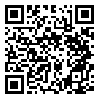Volume 3, Issue 7 (Autumn-Spring- 2006)
2006, 3(7): 91-107 |
Back to browse issues page
Download citation:
BibTeX | RIS | EndNote | Medlars | ProCite | Reference Manager | RefWorks
Send citation to:



BibTeX | RIS | EndNote | Medlars | ProCite | Reference Manager | RefWorks
Send citation to:
mousavi K. Similarity and Coherence in the Story of
Pir-e-changi. Journal title 2006; 3 (7) :91-107
URL: http://fis.khu.ac.ir/article-1-833-en.html
URL: http://fis.khu.ac.ir/article-1-833-en.html
Shahr-e Kord University , mousavikazem@yahoo.com
Abstract: (10391 Views)
Moulavi's Mathnavi opens with no praise to God and there is no resolution for the third brother as the protagonist of the story of Deje Housh Roba ( Enchanting Castle ) either. It seems that Moulavi considers the continuity of time as one of the most important components of the cosmos in which every single person plays his vital role and helps move this circle of life.
This issue, which looks as one of the basic issues of mysticism, has a remarkable manifestation in Moulavi's Mathnavi. The story of Pir Changi is an excellent example of this approach. It consists of two major characters who assume totally different social positions on the literal Level. However, at the deeper level, Omar and Pir Changi have strong affinities with each other. That's why they both reach to unification at the end of the story; a unification that depicts the ever going interaction between human beings and all creatures in the universe.
This issue, which looks as one of the basic issues of mysticism, has a remarkable manifestation in Moulavi's Mathnavi. The story of Pir Changi is an excellent example of this approach. It consists of two major characters who assume totally different social positions on the literal Level. However, at the deeper level, Omar and Pir Changi have strong affinities with each other. That's why they both reach to unification at the end of the story; a unification that depicts the ever going interaction between human beings and all creatures in the universe.
Type of Study: Research |
References
1. قرآن کریم
2. الیاده، م. (1375). اسطوره، رؤیا، راز. ترجمه رؤیا منجم. چاپ دوم. تهران: فکر روز.
3. پورنامداریان، تقی. (1380). در سایه آفتاب. تهران: سخن.
4. خاقانی، افضل الدین بدیلبنعلی. (1378). دیوان اشعار. به کوشش ضیاءالدین سجادی. چاپ ششم. تهران: زوّار.
5. دهخدا، علی اکبر. (1377). لغتنامه. چاپ دوم از دوره جدید. تهران: دانشگاه تهران.
6. ستاری، جلال. (1374). عشق صوفیانه. تهران: مرکز.
7. شایگان، داریوش. (1381). بتهای ذهنی و خاطره ازلی. چاپ پنجم. تهران: امیرکبیر.
8. شمیسا، سیروس. (1378). انواع ادبی. چاپ ششم. تهران: فردوس.
9. شمیسا، سیروس . (1383). داستان یک روح. چاپ ششم. تهران: فردوس.
10. شولتز، دوان پی؛ و دیگران. (1378). تاریخ روانشناسی نوین. چاپ ششم. تهران: دوران.
11. صائب تبریزی، محمد علی. (1375). دیوان اشعار. به کوشش محمد قهرمان. چاپ سوم. تهران: علمی و فرهنگی.
12. علیخواه، م. (1371). خواب، رؤیا، روح. تهران: جمالالحق.
13. فروم، اریک. (1380). زبان از یاد رفته. ترجمه ابراهیم امانت. چاپ هفتم. تهران:
14. فیروزه.
15. فوردهام، ف. (2536). مقدمهای بر روانشناسی یونگ. ترجمه مسعود میربها. چاپ سوم. تهران: اشرفی.
16. کزازی، میرجلالالدین. (1376). رؤیا، حماسه، اسطوره. چاپ دوم. تهران: مرکز.
17. گورین، ویلفرد. ال؛ و دیگران. (1370). راهنمای رویکردهای نقد ادبی. ترجمه زهرا میهنخواه. تهران: اطلاعات.
18. مولوی، جلالالدین. (1379). مثنوی معنوی. شارح کریم زمانی. چاپ هشتم. تهران: اطلاعات.
19. یونگ، کارل گوستاو. (1371). خاطرات، رؤیا، اندیشهها. ترجمه پروین فرامرزی. چاپ دوم. مشهد: آستان قدس رضوی.
20. یونگ، کارل گوستاو (1373). روانشناسی و کیمیاگری. ترجمه پروین فرامرزی. مشهد: آستان قدس رضوی.
21. یونگ، کارل گوستاو. (1383). انسان و اسطورههایش. ترجمه حسن اکبریان. تهران: دایره.
22. یونگ، کارل گوستاو. (1383). انسان و سمبولهایش. ترجمه محمود سلطانیه. چاپ چهارم. تهران: جامی.
Send email to the article author
| Rights and permissions | |
 |
This work is licensed under a Creative Commons Attribution-NonCommercial 4.0 International License. |







